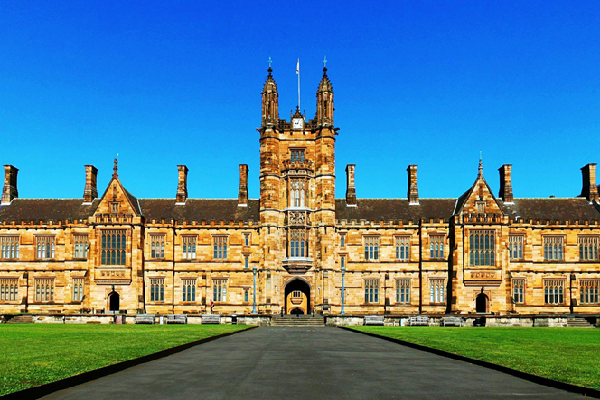University of Sydney climbs 22 places, ranked 19th globally in QS rankings
Vice-Chancellors, Provosts and Deputy Vice-Chancellors, heads of international, marketing and engagement functions, representatives from Quacquarelli Symonds (QS), government departments and higher education bodies around Australia gathered at the University to celebrate Australian universities leaping up the global rankings.
The University of Sydney jumped 22 places in the highly regarded 2024 QS World University Rankings, now placed equal 19th globally, among the top 20 universities in the world.
Australian universities are now considered some of the world’s best with the University of Sydney advancing 22 places to equal 19th in the world and equal second in Australia – tying with UNSW.
University of Sydney Chancellor Belinda Hutchinson AC welcomed the distinguished guests who travelled from around Australia and internationally to attend the event to unveil the new QS World Rankings methodology and celebrate the University’s achievement of breaking into the top 20 of the Rankings.
The Chancellor highlighted the inspiring work of the University’s staff and students as the driving force behind this significant milestone and commended the University of New South Wales for sharing the 19th spot in the world rankings.
It shows what a great city Sydney is for higher education.
University of Sydney Chancellor Belinda Hutchinson AC
“While I am of course incredibly proud of this year’s ranking result, putting us amongst the world’s best universities, I am even prouder of what the data underpinning the results demonstrates: it is based on the outstanding achievements of our staff and students and how they contribute to the public good.”
Ms Hutchinson reflected on the work demonstrating ‘leadership for good’: the value that drives the University’s belief in education for all, and in leadership for improving the lives of people in the communities we serve.
“Leadership is not about the numbers or status. It is about the difference you can make. The difference you can make to individuals and the local, national and international communities we serve.”
“The 2024 QS rankings provides an insight into what that looks like in practice. They recognise the importance of sustainability, employment outcomes and global partnerships, where we have worked hard over the past decade to extend and deepen our ties.”
A Sydney alumna who travelled from the UK to speak at the event, QS CEO Jessica Turner said she was thrilled to be back on campus.
“I’m delighted to be here again after all these years and I just would never have imagined as a graduate that I would be standing here, leading a global organisation all of these years later. It is a testament to what a great undergraduate education can give you. Thank you very much to the University.”
The QS World University Rankings are some of the most comprehensive rankings of their kind and this year they changed their methodology by introducing three new metrics to reflect shifts in the sector and changing priorities of students.
Ms Turner said the innovative changes meant performances were being evaluated in a new way.
“Many Australian institutions are forward-thinking and the dynamism of the sector here, that focuses on research, impact, employability and sustainability and those links built across multiple countries, have helped to achieve incredible performance and we are so pleased to have three Australian institutions in our top 20 globally.”
Ms Turner said many Australian universities had done exceptionally well in the QS rankings.
What is really clear is that Australian institutions stand out in their service to students, both Australian and international.
QS CEO and University of Sydney alumna Jessica Turner
UNSW Sydney’s Deputy Vice-Chancellor (Research & Enterprise) Professor Nicholas Fisk also spoke at the event, noting that Sydney is now home to 10 percent of the world’s top universities.
Reflecting on his time at the University as a student and staff member he highlighted the significance of having four universities in the world’s top 150 and six universities in the top 200.
Congratulating the Australian universities on their rise, he noted how many viewed University of Sydney and UNSW as highly competitive.
“But the reality is different. Yes, we compete, but we collaborate in many areas. Marine ecology, mental health, quantum computing – and particularly in medicine and health. Currently, 10 percent of our outputs in medicine and health are jointly authored between the two institutions, and that figure is rising. We can do more, and both our Vice-Chancellors are committed to closer working together.”

